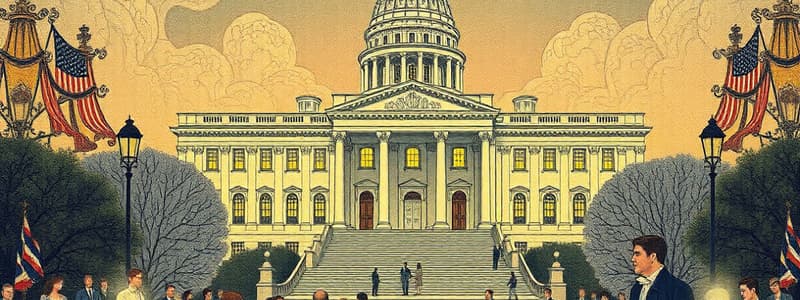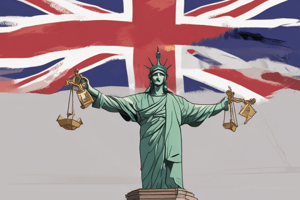Podcast
Questions and Answers
Which of the following branches of government is responsible for interpreting laws?
Which of the following branches of government is responsible for interpreting laws?
- Legislative
- Electoral
- Judicial (correct)
- Executive
The Electoral College is a group of people who directly elect the president.
The Electoral College is a group of people who directly elect the president.
False (B)
What is the primary purpose of the U.S. Election process every four years?
What is the primary purpose of the U.S. Election process every four years?
To select leaders.
The act of counting votes is known as a _______.
The act of counting votes is known as a _______.
Match the following election-related terms with their definitions:
Match the following election-related terms with their definitions:
What is the main purpose of checks and balances in the U.S. government?
What is the main purpose of checks and balances in the U.S. government?
The Electoral College is responsible for creating laws in the U.S. government.
The Electoral College is responsible for creating laws in the U.S. government.
Who leads the legislative branch of the U.S. government?
Who leads the legislative branch of the U.S. government?
In a democracy, __________ have the power to make decisions.
In a democracy, __________ have the power to make decisions.
Which branch of government is responsible for upholding the law?
Which branch of government is responsible for upholding the law?
Match the following concepts with their descriptions:
Match the following concepts with their descriptions:
What is a key strategy in political campaigns?
What is a key strategy in political campaigns?
What is the main purpose of checks and balances in the government?
What is the main purpose of checks and balances in the government?
The legislative branch of the U.S. government is located in the White House.
The legislative branch of the U.S. government is located in the White House.
What celebration marks the start of a new president's term?
What celebration marks the start of a new president's term?
How many electoral votes are needed to win the presidency?
How many electoral votes are needed to win the presidency?
The _____ branch of government can veto laws.
The _____ branch of government can veto laws.
Which of the following is true about the Electoral College?
Which of the following is true about the Electoral College?
What is a campaign slogan?
What is a campaign slogan?
Match the following branches of government with their descriptions:
Match the following branches of government with their descriptions:
When candidates travel from city to city to meet voters, this is called:
When candidates travel from city to city to meet voters, this is called:
Flashcards
Candidate
Candidate
A person who is running for a political position in an election.
Campaign
Campaign
A series of activities designed to persuade voters to support a candidate.
Judicial Branch
Judicial Branch
The part of government that interprets laws and decides if they are fair.
Election
Election
Signup and view all the flashcards
Political Party
Political Party
Signup and view all the flashcards
Tally
Tally
Signup and view all the flashcards
President
President
Signup and view all the flashcards
Symbol
Symbol
Signup and view all the flashcards
Debate
Debate
Signup and view all the flashcards
Inauguration
Inauguration
Signup and view all the flashcards
Electoral College
Electoral College
Signup and view all the flashcards
Vote
Vote
Signup and view all the flashcards
Ballot
Ballot
Signup and view all the flashcards
Democracy
Democracy
Signup and view all the flashcards
Election Purpose
Election Purpose
Signup and view all the flashcards
Candidate
Candidate
Signup and view all the flashcards
Ballot
Ballot
Signup and view all the flashcards
Executive Branch Leader
Executive Branch Leader
Signup and view all the flashcards
Political Party
Political Party
Signup and view all the flashcards
Judicial Branch
Judicial Branch
Signup and view all the flashcards
Legislative Branch
Legislative Branch
Signup and view all the flashcards
Debate
Debate
Signup and view all the flashcards
Democratic Power
Democratic Power
Signup and view all the flashcards
Inauguration
Inauguration
Signup and view all the flashcards
Supreme Court's Branch
Supreme Court's Branch
Signup and view all the flashcards
Checks and Balances Purpose
Checks and Balances Purpose
Signup and view all the flashcards
Checks and Balances
Checks and Balances
Signup and view all the flashcards
Presidential Veto
Presidential Veto
Signup and view all the flashcards
Electoral College
Electoral College
Signup and view all the flashcards
Electoral Votes Needed to Win
Electoral Votes Needed to Win
Signup and view all the flashcards
Electoral College and State Population
Electoral College and State Population
Signup and view all the flashcards
Campaign
Campaign
Signup and view all the flashcards
Campaign Slogan
Campaign Slogan
Signup and view all the flashcards
Campaign Debate
Campaign Debate
Signup and view all the flashcards
Campaign Trail
Campaign Trail
Signup and view all the flashcards
Campaign Activities
Campaign Activities
Signup and view all the flashcards
Legislative Branch Location
Legislative Branch Location
Signup and view all the flashcards
Executive Branch Location
Executive Branch Location
Signup and view all the flashcards
Judicial Branch Location
Judicial Branch Location
Signup and view all the flashcards
Study Notes
U.S. Government, Elections, and Symbols
- Democracy: A system where citizens vote for their leaders.
- Election Purpose: To choose leaders.
- Candidate: Someone who wants to be elected to a position.
- Ballot: Used to collect votes for a candidate.
- Executive Branch Leader: The President.
- Political Party: Groups of people working together to choose leaders.
- Law Upholding Branch: The Judicial branch.
- Law Making Branch: The Legislative branch.
- Checks and Balances: Prevent any one branch from having too much power.
- Electoral College: Officially elects the president based on state votes.
- Electoral Votes Needed to Win: 270.
- Senate: One part of the Legislative branch.
- House of Representatives: Another part of the Legislative branch.
- Supreme Court: Part of the Judicial branch.
Multiple Choice Questions
- Democracy definition: A system where citizens vote for their leaders.
- Election purpose: Choosing leaders.
- Candidate: Someone seeking election.
- Ballot function: Collecting votes.
- Executive leader: President.
- Political party: Groups of people choosing leaders.
- Law upholding branch: Judicial.
- Law making branch: Legislative.
- Checks and balances: Preventing power imbalances in government.
- Electoral College function: To officially elect the president.
- Electoral vote count: 270 votes are needed to win the presidency.
Studying That Suits You
Use AI to generate personalized quizzes and flashcards to suit your learning preferences.




